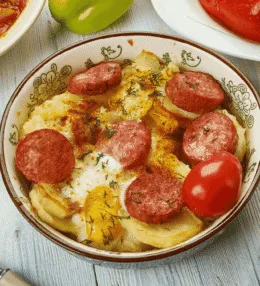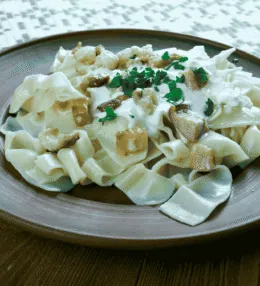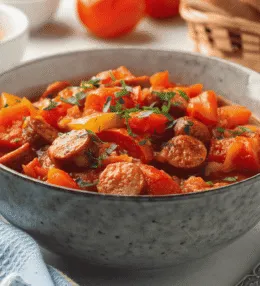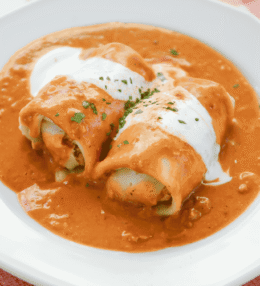
- View
Table of Contents
ToggleEnsalada Rusa, or Russian Salad, is a dish that has found a beloved place on Argentine tables, especially during festive occasions and family gatherings. Known for its creamy texture and refreshing flavour, this simple yet satisfying salad is a staple at holiday meals, often served as part of an elaborate spread.
With its mix of tender vegetables and rich dressing, Ensalada Rusa embodies the warmth and conviviality of Argentine cuisine, making it a dish that’s both comforting and celebratory.
Want to dive deeper into Argentine Cuisine? Don’t miss our post on 20 Traditional Argentine Foods to Try
What Is Ensalada Rusa?
Ensalada Rusa is a cold salad made primarily from boiled potatoes, carrots, and peas, all brought together in a creamy mayonnaise dressing. Though the recipe is straightforward, the combination of ingredients results in a salad that is both hearty and refreshing.
Some variations include additions like boiled eggs or green beans, and in Argentina, it’s not uncommon to find versions with a touch of mustard or vinegar for added tang. This salad is a mainstay of Argentine holiday meals, particularly Christmas and New Year’s Eve, where it complements roasted meats and other rich dishes.
It’s also a popular choice for barbecues, offering a cool, creamy contrast to smoky grilled meats. While it’s simple in concept, Ensalada Rusa has a versatility and universal appeal that makes it a cherished part of Argentina’s culinary landscape.
Ingredients and Taste
The core ingredients of Ensalada Rusa are potatoes, carrots, and peas, which are boiled until tender but not mushy, retaining their texture and flavour. These are mixed with mayonnaise, creating a creamy coating that binds the vegetables together.
Salt and pepper are added for seasoning, with some recipes incorporating a hint of vinegar or lemon juice to balance the richness of the dressing. Occasionally, boiled eggs or green beans are added, adding extra layers of texture and taste.
The flavour of Ensalada Rusa is mild and comforting, with the creamy mayonnaise providing a luscious base that allows the natural sweetness of the carrots and peas to shine through.
The potatoes add a satisfying heartiness, while the occasional tang of vinegar or mustard cuts through the richness, keeping the dish light and refreshing. It’s this balance of flavours and textures that makes Ensalada Rusa a perennial favourite.
A Taste of History
Despite its name, Ensalada Rusa has a fascinating journey that connects it to global culinary traditions. The dish is believed to have originated in Russia in the mid-19th century, created by a Belgian chef named Lucien Olivier.
His original recipe, known as Olivier Salad, was far more elaborate, featuring luxurious ingredients like caviar and game meats. Over time, the recipe spread across Europe, adapting to local tastes and ingredients.
In Argentina, Ensalada Rusa arrived with European immigrants, particularly from Italy and Spain, who brought their own versions of the dish. Here, it evolved into a simpler, more accessible salad that could be made with readily available ingredients.
Its popularity grew, and it became a fixture at Argentine celebrations, where it’s now considered an essential part of holiday and barbecue menus. Today, Ensalada Rusa continues to be a symbol of tradition and togetherness in Argentina.
Its simple preparation and satisfying flavours make it a versatile dish that fits seamlessly into both everyday meals and festive occasions. Whether you’re enjoying it alongside a grilled steak at an asado or as part of a holiday feast, Ensalada Rusa offers a taste of Argentina’s vibrant culinary heritage with every bite.

Argentine Ensalada Rusa (Russian Salad)
Equipment
- Large pot
- Saucepan
- Colander
- Mixing bowl
- Small bowl
- Spoon or spatula
- Plastic wrap
Ingredients
- 3 medium potatoes peeled and diced
- 2 medium carrots peeled and diced
- 1 cup frozen peas
- 1 cup mayonnaise
- 1 tbsp olive oil
- 1 tsp white vinegar or lemon juice
- Salt and black pepper to taste
- Optional: 2 hard-boiled eggs diced, for garnish
Instructions
- To begin, bring a large pot of salted water to a boil. While waiting, peel and dice the potatoes and carrots into uniform, bite sized pieces to ensure even cooking. Prepare a colander for draining once cooked.
- Once the water is boiling, add the diced potatoes and carrots to the pot. Cook for about 8–10 minutes, or until they are tender but not mushy. Test by piercing a piece with a fork; it should slide off easily. Drain immediately and set aside to cool.
- In a smaller saucepan, bring water to a boil and blanch the peas for 2–3 minutes. Drain and rinse them under cold water to preserve their vibrant green colour. Allow the peas to cool completely before using.
- While the vegetables cool, prepare the dressing. In a small bowl, whisk together the mayonnaise, olive oil, and vinegar or lemon juice. Season with a pinch of salt and black pepper, adjusting to taste. The dressing should be creamy and lightly tangy.
- Once the vegetables are cool, transfer them to a large mixing bowl. Add the peas and gently toss them together to distribute evenly. Avoid overmixing to maintain the integrity of the vegetables.
- Pour the prepared dressing over the vegetables. Using a large spoon or spatula, fold the mixture gently to coat everything evenly. Ensure each piece is well covered while avoiding breaking the vegetables.
- Cover the bowl with plastic wrap and refrigerate for at least 30 minutes before serving. This chilling time allows the flavours to meld beautifully. If desired, dice hard-boiled eggs to use as an optional garnish.
- To serve, transfer the Ensalada Rusa to a clean serving dish. Garnish with diced hard-boiled eggs if using, and a sprinkle of black pepper for contrast. Serve as a chilled side dish alongside roasted meats, grilled chicken, or as part of a festive spread. Pair with crusty bread or fresh greens for a complete meal.
Nutrition
You May Also Like








